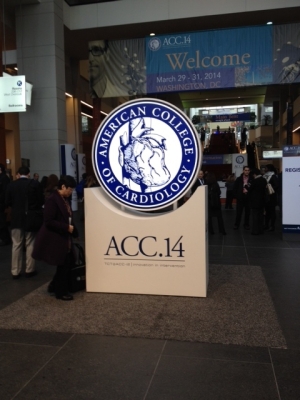By Loren Bonner and Lauren Dubinsky
The American College of Cardiology's 63rd Annual Scientific Session and Expo wrapped up on Monday in Washington, DC. As always, the show was a platform for breaking clinical trial results — those that are sure to have an impact on the industry for years to come. This year there was big news for transcatheter aortic valve replacement (TAVR) and renal denervation — promising procedures we've been hearing about for years. This news, in addition to other observations, made our top five trend list from ACC14. Please feel free to share your observations in the comments section below.
1.) A setback for renal denervation— At ACC14, the results of the much-anticipated SYMPLICITY HTN-3 trial were released, leaving many disappointed and U.S. Food and Drug Administration approval for the technology on the back burner. Renal denervation, which many experts claimed would be a "game-changing" technology, is used to lower blood pressure through a catheter-based device by applying radiofrequency pulses to the renal arteries. But renal denervation did not meet the primary and secondary efficacy goals in patients with severe resistant hypertension in this trial, although it did meet the primary safety endpoints.



Ad Statistics
Times Displayed: 172711
Times Visited: 3121 For those who need to move fast and expand clinical capabilities -- and would love new equipment -- the uCT 550 Advance offers a new fully configured 80-slice CT in up to 2 weeks with routine maintenance and parts and Software Upgrades for Life™ included.
The trial was the largest study that investigated the efficacy of renal artery denervation as a treatment for resistant hypertension, and it was also the most thoroughly-designed, since it involved blinding and sham treatment in the control arm.
"There really wasn't any significant benefit here," Dr. Deepak Bhatt of Brigham and Women's Hospital in Boston, Mass. and the study's lead author, said at ACC's Late-Breaking Clinical Sessions Deep Dive on Monday.
But some experts still have hope. "Further down the road, I would hope that the procedure can work," said Dr. Robert Califf of Duke University Medical Center.
Many big device companies have renal denervation technology under investigation and will likely be examining data from this study to determine what to do going forward.
2.) Big news for TAVR— Meanwhile, TAVR received a boost when results from a prospective study on Medtronic's CoreValve System showed that for the first time, high-risk patients with severe aortic stenosis had lower death rates at one year, compared with conventional surgical valve replacement. Many experts, including Dr. Keith Dawkins from Boston Scientific, told DOTmed News that the results are pivotal because they show that TAVR could be "superior to surgery" for certain patients. TAVR involves transporting a prosthetic valve through a catheter in the leg to the heart in patients with aortic stenosis. Medtronic received FDA clearance for CoreValve in early 2014. The only other TAVR device on the market is Edwards Lifesciences' SAPIEN Transcatheter Heart Valve.

